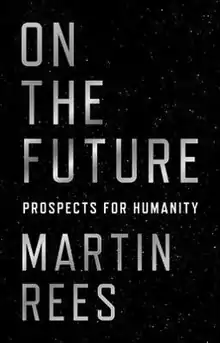 | |
| Author | Martin Rees |
|---|---|
| Country | United Kingdom |
| Language | English |
| Genre | Science |
| Published | October 16, 2018 (Princeton University Press) |
| Media type | Print (hardcover) |
| Pages | 272 |
| ISBN | 9780691180441 |
On the Future: Prospects for Humanity is a 2018 nonfiction book by British cosmologist and Astronomer Royal Martin Rees.[1] It is a short, "big concept" book on the future of humanity and on potential dangers, such as nuclear warfare, climate change, biotech, and artificial intelligence, and the possibility of human extinction.[2]
Ideas
As with his 2003 Our Final Century, Rees warns that human civilization faces grave existential risks.[3]
Rees considers a scenario 20 years from now, where carbon dioxide levels have continued to rise, and where climate models have improved. There is a possibility the improved models will predict imminent catastrophe, in which case there might emerge political pressure to immediately deploy poorly-understood geo-engineering techniques. In order to mitigate this "nightmare" scenario, Rees advocates that we start exploring these techniques now, so as to better understand their limitations, risks, and side effects.[4]
Other risks include nuclear war, an asteroid strike, rogue biotechnology, or artificial intelligence. Rees advocates that nations empower supra-national institutions to better collaborate against such risks, a difficult task given the populist trends against globalism.[5] Some scholars, such as Stephen Hawking, have advocated space colonization as a way to mitigate existential risk; Rees breaks with Hawking on this matter and criticizes space colonization as "a dangerous delusion to think that space offers an escape from Earth's problems".[6]
Reception
Vanity Fair assessed the book as "uncontroversial... written in a way that's accessible to the general reader, and sprinkled with moments of infectious awe."[2] Scientific American recommended the book as a "spirited assessment of technology's role in shaping our future".[7] Engineering & Technology assessed it as "short, but persuasive".[8] A New Statesman review stated "Remarkably, what seems like an extended state-of-the-planet essay does not feel as depressing as it ought: Rees dispenses his apocalyptic overview of the coming decades like cocktail party wisdom".[5] The Financial Times called it "crisply written";[3] Publishers Weekly called it "far-ranging but easily understood".[9] Kirkus Reviews called it "A book to be read by anyone on Earth who cares about its future."[10]
On November 23, 2018, the Israeli newspaper Yediot Aharonot reported that during a tense parliamentary debate in the Knesset, Prime Minister Netanyahu was observed engrossed in a copy of On The Future, marking passages and writing notes, and only occasionally raising his head to follow the ongoing debate in the plenum.[11]
References
- ↑ "ON THE FUTURE by Martin Rees | Kirkus Reviews". 2018. Retrieved 6 November 2018.
- 1 2 Conway, Louie (2018). "On the Future: Prospects for Humanity by Martin Rees". Vanity Fair. Retrieved 6 November 2018.
- 1 2 Cornwell, John (2018). "Can humanity survive the future?". Financial Times. Retrieved 6 November 2018.
- ↑ "A cosmologist advocates thoughtful deployment of science and technology to address the challenges facing humanity". Books, et al. (Science Magazine). 12 September 2018. Retrieved 6 November 2018.
- 1 2 "Reasons to be cheerless: all the ways in which humanity might soon be obliterated". New Statesman. 2018. Retrieved 6 November 2018.
- ↑ Horgan, John (2018). "'Brief Answers to the Big Questions' and 'On the Future' Review: Serious Doubt on Serious Earth". WSJ. Retrieved 6 November 2018.
- ↑ "The Dark World of Wildlife Trafficking, Martin Rees on the Future and Other New Science: Book recommendations from the editors of Scientific American". Scientific American. October 2018. Retrieved 1 April 2019.
- ↑ Lenton, Dominic (8 January 2019). "Book review: 'On the Future: Prospects for Humanity' by Martin Rees". Engineering & Technology. Retrieved 1 April 2019.
- ↑ "On the Future: Prospects for Humanity". www.publishersweekly.com. 2018. Retrieved 1 April 2019.
- ↑ "ON THE FUTURE by Martin Rees | Kirkus Reviews". Kirkus Reviews. Retrieved 1 April 2019.
- ↑ Parliamentary report by Oded Shalom in Yediot Aharonot, Nov. 23, 2018.
External links
- Publisher website
- ABC interview with Rees